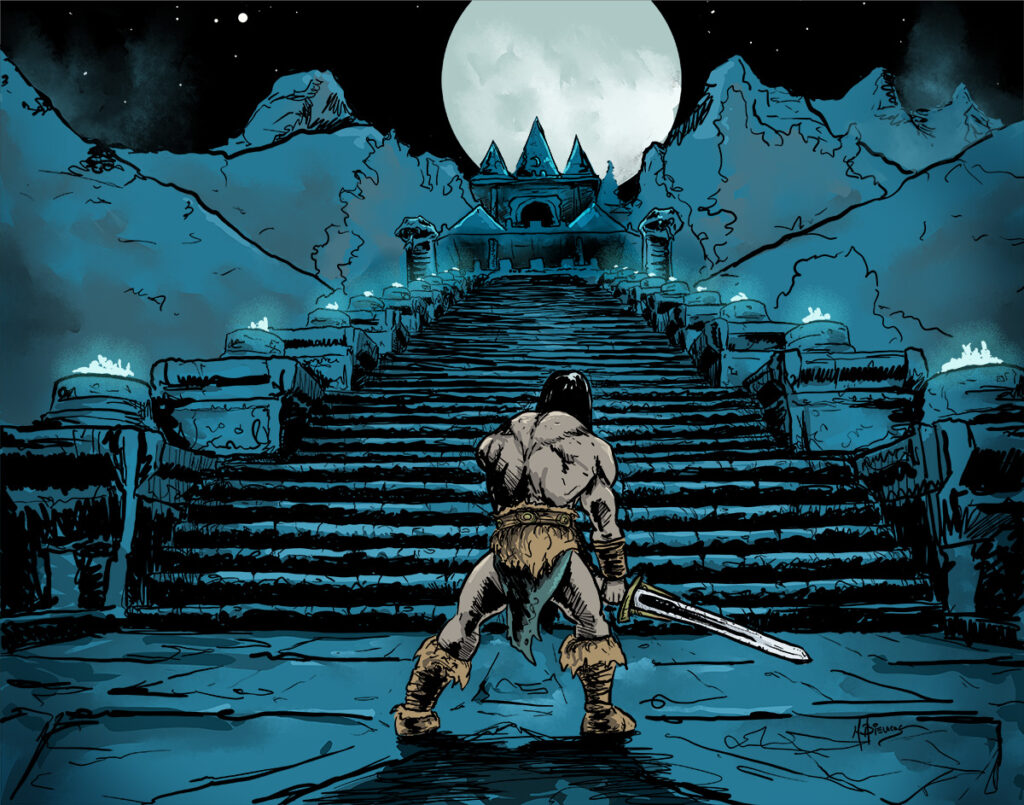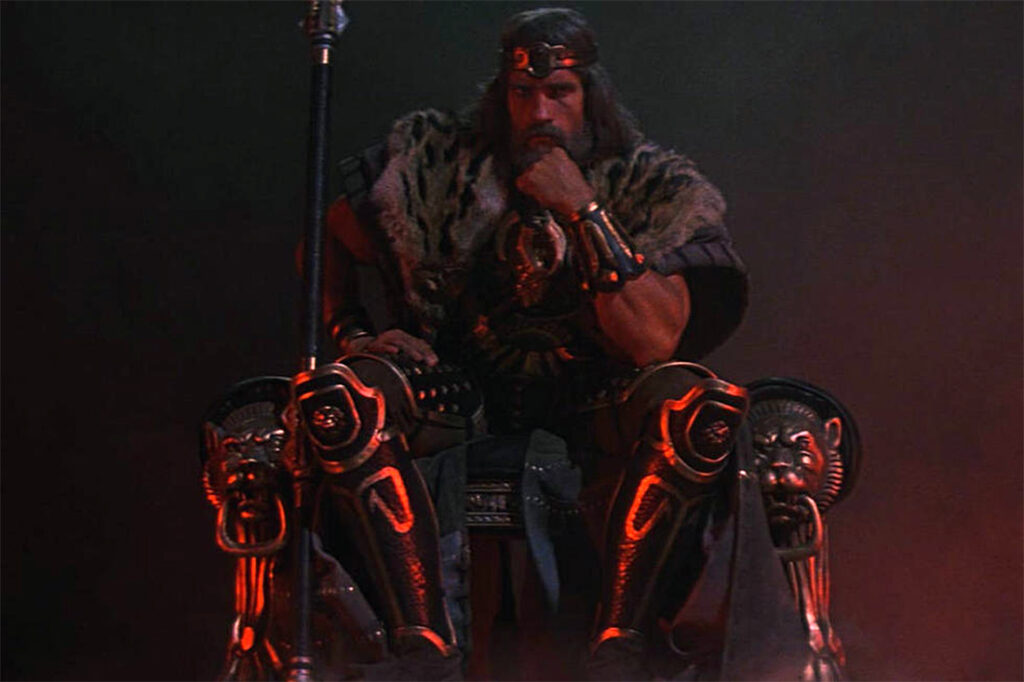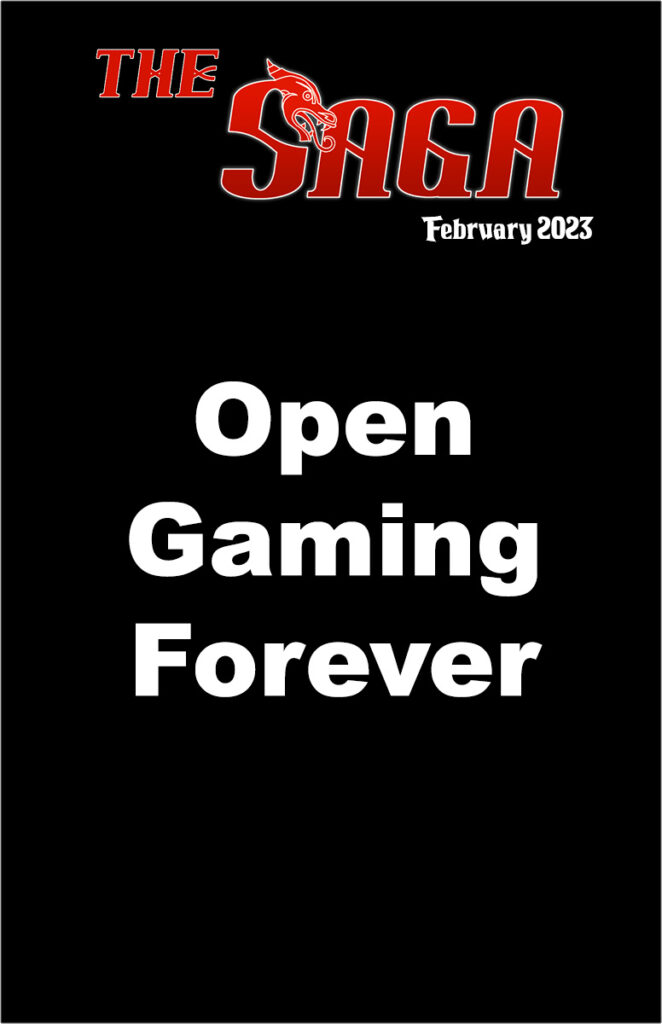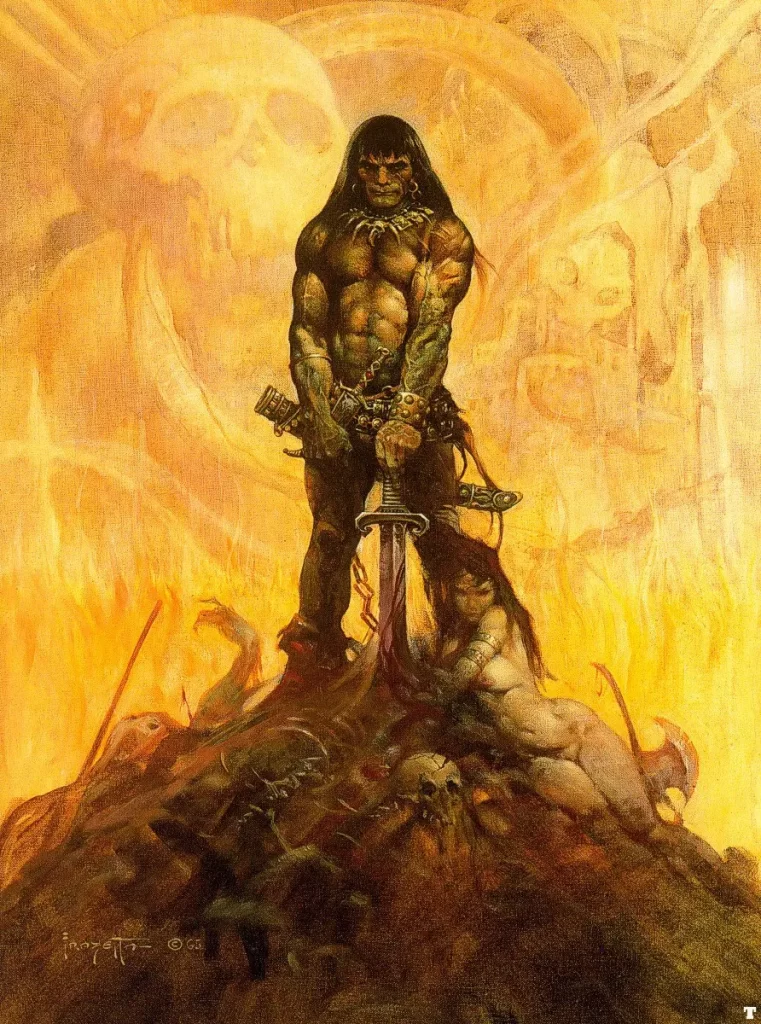
It’s time for that discussion of imagination again, the Appendix i of our creativity, where Dane and Mike discuss the things that made them the creatives they are.
Mike:
This month we are visiting the inspiration that really started the whole sword and sorcery thing we love so much. It’s time to travel to the Hyborian Age.
Between the time when the oceans drank Atlantis, and the rise of the sons of Aryas, there was an age undreamed of. And unto this, Conan, destined to wear the jeweled crown of Aquilonia upon a troubled brow. It is I, his chronicler, who alone can tell thee of his saga. Let me tell you of the days of high adventure!
Start the amazing soundtrack from Basil Poledouris.
Nothing gets me in the mood for tabletop gaming more than that intro and soundtrack.
So we can’t speak of inspiration in fantasy without thinking of Conan. My first fantasy story, when I was in the third grade, was about a barbarian. He was a complete rip-off of Conan, and he even cursed to his god, Rom (who is the god of war 40 years later in my current writing). Also, that led to my first understanding of making art and critique. I handed my father a 4-page story as a third grader, and he read it, handed it back, and said, “don’t use the word ‘damn.”’ Critics, am I right? The movie I put on to hype me up before a big session is often Conan the Barbarian. The covers painted by Frazetta are still unmatched. And the worldbuilding by Howard was so well done. Despite the problematic stuff (it’s almost 100 years old at this point), the world is engrossing.
When we look at what shaped the fantasy that made Dungeons and Dragons, Conan loomed large. And I know Conan was a big part of your fantasy love. So let’s start simple, how did Conan enter your life?
Dane:
Conan the Barbarian came out when I was seven, and I remember being curious about it, but I don’t think I was old enough to appreciate it. I understood the sequel better but only thought of it as a fun, silly movie.
I’ve written about this on Creative Grimoire, but briefly, it was when I was going through a family tragedy when I was thirteen that I found myself staring at the Frank Frazetta painting on the cover of my father’s paperback copy of Conan the Barbarian. It disturbed me about as deeply as anything ever had, and I couldn’t stop looking at it. I was looking for any escape from my life I could find, so I started reading, and had never, at that point, felt so immersed in a book. Hours slid by without me noticing, and I believe it was the very next day I went digging through my father’s collection for book two.
I’d read some fantasy novels of the lighter variety and was into them, but I understood quickly that this was something different. Where most high fantasy books treated magic as beautiful and otherworldly (if sometimes misused), Conan treated it as dark, mysterious, and possibly originating in the murky depths of the unconscious. Instead of virtuous royals on glorious missions, here was a lone barbarian struggling to survive, attempting to avoid magic and its evils but thrust into its midst by fate and often coming away with his life barely intact.
In some ways, it could almost be considered a horror story.
The biggest surprise was that he didn’t even resemble the bumbling drunkard from Conan the Destroyer. I believe that movie cemented an image of what Conan is in the minds of most people, and it’s unfortunate.
Mike:
Conan is viewed so differently by so many people. On the surface, I would think I wouldn’t be attracted to Conan at all. A larger-than-life, muscle-bound “barbarian” who is a Gary-Stu (mildly joking) is not my first choice of hero to read about. But there is just something fun about the pulpiness of Conan and his adventures. Sure, a bit of it doesn’t stand up to the standards of time, but these are stories written almost 100 years ago. The old pulp stories caught a sense of adventure that many stories these days don’t have. To travel through other lands and places while sitting on the bus reading has always been the first joy of reading. It’s a vacation to a new place without all the travel mess. Conan was written because Howard wanted to write historical fiction but didn’t want to get bogged down with making sure all the history was right. So it’s like having an adventure in a parallel universe, which is always fun.
So creatively, how do you think Conan has shaped your view of fantasy or fiction in general?
Dane:
It really was the beginning of the development of my style.
When I first decided I wanted to be a writer, I’d only read cheesy fantasy (though I didn’t yet realize it), but those books took me to another world, so that’s what I wanted to write. I even wrote seven chapters that were probably terrible.
Then I read Conan, and I discovered something different. Now I wanted to make readers feel that thing Conan had made me feel…a sense of dread and discomfort. Dread and discomfort can be fun and lead to self-discovery when the threat is imaginary. I think that’s one of the reasons for fiction, so why not dive into that?
On the other hand, Conan has since also become an example of what not to do in my writing. As a kid, I wasn’t conscious of the problematic nature of some of the representations. But now I’m aware, and I do my best to avoid those stereotypes.
Mike:
It’s such a delicate balance to deliver in any artistic fashion. There is the want to write (or make) what you know and, at the same time, be inclusive. And no matter your background, being inclusive means you are going to include things outside of your experience. And those of us who try our best to be inclusive have to live in a world where Avatar 2 makes 2 billion. But that’s a whole other story… or rant?

In the end, no art ages well. So many people hate artists like Warhol or Rothko, but they were expressions of their times, and we live in the world they shaped, for good or evil. The same with Lovecraft and Howard. There is a lot to learn about writing, both good and bad, from both of them. And sometimes themes come back around. One big thesis in Conan was that “barbarism” was better than the corrupt, abusive “civilization.” That viewpoint has long since been lost, though I will agree that the word “barbarian” has been used with negative connotations way more throughout history.
So how does this problematic, ancient (again, almost 100 years old) pulp fiction keep calling to people? I also think it is a call not to barbarism but to nature. Conan also represents a simpler life. And not that bullshit, false, “the 50’s were better” simpler life. I am talking about getting out and away from stuff. So many times on a weekend, I have a list of things to do. Besides the house chores, lots of them include being behind a screen. Writing, making art, promoting, all under the hum of LED lights (do LEDs hum? I dunno, it feels like they do). But then I get up and drive to a trail somewhere and take a stroll with my partner, and everything gets better. As I walk down those paths, I feel my back straighten, my breathing easier, and the heaviness just lifts. No Twitts, no booking, no endless organizing of writing documents in online clouds. Just a peacefulness. And I think Conan represents that, and it is something we all need to think about more these days.
Dane:
We can definitively say, at this point, after so many studies, that nature is good for our health and makes us happier. If you have anxiety or depression, one suggestion a doctor or expert might give: spend some time in nature.
Before I found Conan, the most formative part of my childhood was living in Los Alamos at the top of a canyon. I had a path that led right down into the ravine, and some of my best memories are of wandering down there, enjoying the sights, smells, and sounds. I remember profound feelings of peace and happiness.
I’ve spent the rest of my life believing we’ve lost an integral part of our humanity by boxing ourselves inside square rooms in square homes inside neighborhoods inside cities connected by interstate highways, so far removed from nature.
It’s great for mental health to spend a little time in nature, but even then, I think something is missing. The immediacy. The danger. The simplicity. The sense of awe nature can give us.
Conan books have cities, but they’re young, and the best parts happen in the wild or in places ancient and forgotten. I had the sense of a philosophical debate between the forces of civilization and the ineffable power of nature.
Of course, much of that comes from Frazetta’s artwork. I often wonder if my experience with Conan would have been much different if the art on the covers hadn’t already set a specific tone.
Mike:
Tone. That’s a great word to describe what lasts with Conan and me. In the art, the film, and the descriptive writing, I see small bits of Conan reflected in the style of the Dark Return. It’s something for us all to strive for in our creativity, setting a tone that fills us with a sense of adventure!



